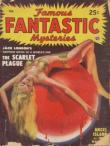A belated response from Bertram Chandler (as George Whitley) to "Australia Protests," Stirling Macoboy's criticism of the dialect used by the narrator in his 1947 story, "Boomerang." The Macoboy letter was published 12 months earlier in the February 1948 edition of Famous Fantastic Mysteries (pp.121-122). Chandler, who was at sea at the time, did not receive a copy of the issue until many months later and hence the delay in responding. In concluding his defence Chander writes:
I admit that I may have caricatured, to a slight extent, the kind of language that one hears spoken on the Sydney waterfront. And is not the kind of language I should expect to hear in Mr. Macaboy's drawing room - any more than he would expect to hear Cockney - and I live in Greater London - spoken in mine. But I shouldn't mind betting that if he cares to drop in for a friendly cup of tea twenty years or so after the rockets have come he will find the survivors - if any - won't be using the kind of English made standard by the announcers of the various Broadcasting Companies and Corporations. Even now, in spite of universal education and the influence of the radio and the better films, the English spoken in all English speaking countries is deplorable. What will it be like once the schools, the broadcasting stations and the cinemas have been destroyed? (p.8).
 5868117812546889521.jpg
5868117812546889521.jpg

